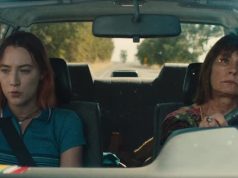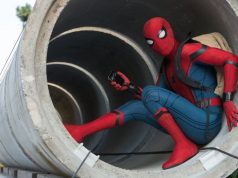There are so many brilliant things about “Borat: Cultural Learnings of America for Make Benefit Glorious Nation of Kazakhstan” that I don’t even know where to start. It’s breathtakingly funny, and I mean that during some scenes I literally laughed so hard I couldn’t breathe. But more than that, it’s one of the most astute satires of American culture that I’ve ever seen. It’s not “politically incorrect” just for the sake of being outrageous. There’s a point to it — actual satire, in other words, not just random acts of goofiness.
Borat is the creation of Sacha Baron Cohen and is one of several characters played by the British comedian in HBO’s “Da Ali G Show.” In his native Kazakhstan, Borat is a well-known TV news reporter, a happy-go-lucky fellow with an enthusiasm for life and an utter unawareness of how sexist, racist, homophobic and anti-Semitic he is. He comes by it innocently, with no malicious intent, apparently unaware that there’s anything hateful about such attitudes.
In the HBO sketches as well as in this movie, Borat comes to America to learn about our culture, interviewing ordinary folks along the way. These people don’t know Borat is a character being played by an actor; I suspect the ones who catch on, or who have seen Borat on HBO and are wise to him, don’t make the final cut. We see only the innocent bystanders, trying to be polite and friendly to a man who is completely clueless about Western society’s rules of etiquette, decorum and hygiene. Because while Borat is offensive, he doesn’t KNOW he’s offensive, you see. So there’s no point getting mad at him.
In the film, he’s here with a cameraman and his producer, Azamat (Ken Davitian), to document his stay in New York City. He meets with a feminist group and a humor coach early on, both examples of the sort of scenarios the HBO series puts him in, where a meeting is prearranged and the unwitting participants must contend with Borat’s strange ways.
Then we catch a whiff of a plot: Borat sees Pamela Anderson on TV and falls madly in love with her. He insists they take their documentary on a road trip to California so he can meet her, giving him a chance to see middle America along the way. He doesn’t tell Azamat his real reason for wanting to go, though. “What’s in California?” Azamat demands. Borat replies, “Pearl Harbor is there. So is Texas.”
There are brief interludes with politicians in Washington, but the film, directed by “Seinfeld” and “Curb Your Enthusiasm” veteran Larry Charles, is more interested in the common man. There are extended sequences in Virginia, Alabama and Texas, as well as the usual road-trip hijinks one expects from a cross-country drive. The film is an exotic mix, then, of TV-style “stunt” scenes involving unsuspecting bystanders, and scenes featuring only Baron Cohen and Davitian. The former can only be planned insofar as you set things in motion and see how people react, while the latter can be more tightly scripted. Wisely, Charles and the actors maintain a loose, improvised feel even on those latter scenes, keeping the tone consistent regardless of whether a scene was actually off-the-cuff or not.
One nice touch is that even when actors could be used, Charles prefers to use hapless civilians to do his dirty work. For example, in one scene Borat must receive a telegram from his village in order to advance the plot. It’s a brief scene; you could easily hire an actor to play the guy delivering the telegram. But instead, the filmmakers sent a real wire to a real telegram office and had a real employee bring the notice to Borat’s hotel room. Why? Because Borat’s unorthodox reaction to the news is much funnier when there’s a witness who doesn’t know it’s all an act.
You see, the film ratchets up the humor by having its actors do their thing out in public, amid non-actors. The idea is that a man running naked through a hotel is only mildly funny if it’s a standard movie scene. Audiences know that it’s a closed-off hallway where only actors and technicians are present, and not an actual functioning hotel. But if we can see that it’s a real hotel, and that the people around the naked man don’t know it’s for a movie, then it’s 10 times funnier. At LEAST 10 times funnier.
I am in awe of Baron Cohen and Davitian’s dedication to their characters, by the way. The things they do in broad daylight in full view of crowds who don’t know they’re only actors are astounding. You think it would be embarrassing to do something foolish on stage? Imagine doing it on a street, where people won’t know you’re performing and will think you just ARE that way.
The film’s most sparkling asset, though, is the way it uses the fictional Borat and his fictional bigotry to bring out the real bigotry in real people. I liked this instance: Borat generally kisses everyone he meets on both cheeks, but an old man in the South rebuffs him, saying we don’t do that sort of thing over here. People think you’re “funny” if you kiss another man. Borat understands he’s talking about homosexuals and says that in Kazakhstan, they hang those people. The old man replies, “We’re trying to get that done here, too!” And your brain snaps: Wait a minute, WHAT? Borat — i.e., Sacha Baron Cohen — was only kidding. But this guy is SERIOUS.
See also the RV full of drunken frat boys who expound their philosophies on women, or the fancy Southern banquet — held at Magnolia Springs Manor on Secession Drive in Helena, Ala. — that comes to an abrupt halt when Borat arranges for a “guess who’s coming to dinner” surprise. You hear about people so racist they can’t stand to be in the same room as one of “them,” but to actually MEET one….
I don’t take any of this as an anti-American screed, though. I doubt Baron Cohen would be surprised to find people like this in his native England, too. Borat has an infectious love for America, and I get the feeling it’s only slightly sarcastic on the part of the filmmakers. It’s scathing satire, audacious, ridiculous and screamingly riotous — but it’s not mean-spirited. It’s just funny. Good heavens, is it ever funny.
[Note: We later learned that the filmmakers cheated a bit in some scenes. Magnolia Springs Manor is not on Secession Drive, for example: The “Secession Drive” sign was filmed somewhere else and interposed to make it look like it’s where the house was.]
A (1 hr., 22 min.; )
In 2012, I reconsidered this movie for my Re-Views column at Film.com.





